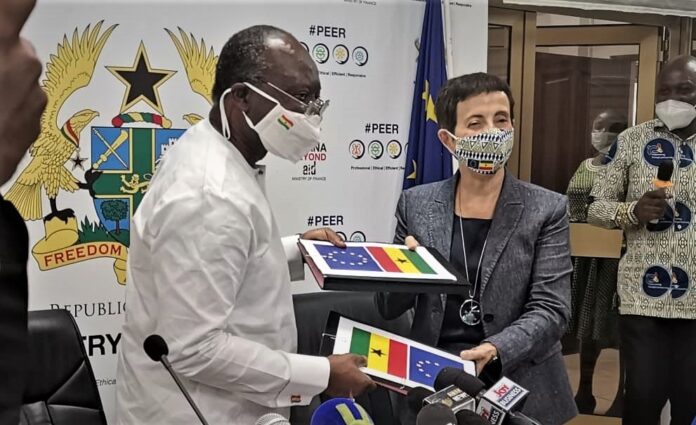
The European Union and the Government of Ghana (GoG) have signed a €92.9 million budget support financing agreement to assist the country in its response to the COVID-19 pandemic as well as beef up security operations in the northern part of the country.
Out of this special emergency budget support, which would be a one tranche disbursement, €87 million will be dedicated to the COVID-19 crises and support the state’s efforts at addressing the economic and fiscal impact of the pandemic with the €5.9 million to be dedicated to preventing electoral violence and providing security to the northern border regions of the country. The grant is expected to hit the state treasury at the Bank of Ghana in a few days.
The support was entailed in two agreements signed by the Minister of Finance Ken Ofori- Atta for the Government of Ghana and the Head of the European Union Delegation to Ghana, Diana Acconcia, on behalf of the EU.
“This action shows the European Union’s commitment to our partnership with Ghana, especially during these challenging times,” Diana Acconcia said at a brief event to sign the agreement at the Ministry of Finance.
She added that the support is part of the EU’s Team Europe package that combines resources from the common EU budget, the member states and the EU financial institution. “Our common objective is to help Ghana respond effectively to the socio-economic impact of the COVID-19 crisis and put in place mitigation measures.”
According to the ambassador, the objective of the €5.9 million facility, to help prevent electoral violence and provide security to the northern border regions, is to equip key government and non-governmental actors in their joint and coordinated efforts to sustain peace, prevent violence, ensure peaceful electoral process and contain the rise of violent extremism.
In his remarks, the Minister of Finance, Ken Ofori-Atta was pleased with the gesture and acknowledged the time and speed at which the EU came together to respond to the crisis. According to him the nation is happy for the grants which came with no indicators, showing the trust the EU has in the nation to prudently disburse the funds to protect lives and livelihoods.
Speaking on what the money would be used for, Mr. Ofori Atta said: “We have really spent a lot of money for lives and livelihoods for this period way beyond what we expected in January and so we still have some more to do. For example, the re-opening of the schools which is going to happen on October 6 immediately requires fumigation, supply of PPE and sanitizers.
You look at the hundreds of thousands of students going and that immediately pushes your budget into levels that you do not anticipate but you cannot risk the life of your future. So those are some of the interventions that are going to be required. In terms of the health sector, we are finalising the numbers for the construction of the 101 district hospitals and that is going to take a bit out of our budget. So, the combination of goods and services and capital expenditure is going to come in very handy for us.”
Present at the event were Ambassador of Italy to Ghana, Daniela d’Orlandi; Ambassador of France to Ghana, Anne Sophie AVÉ; Spanish Ambassador to Ghana, Alicia Rico Pérez; Deputy Head of Mission, Denmark Embassy, Birgit La Cour Madsen; Ambassador of Netherlands in Ghana, Ron Strikker; and High Commission of Malta, Jean Claude Galea Mallia.









